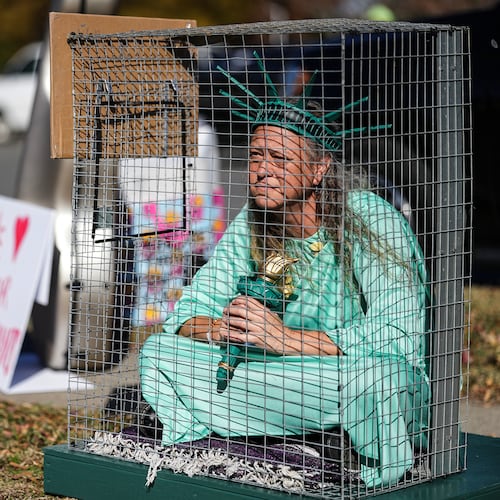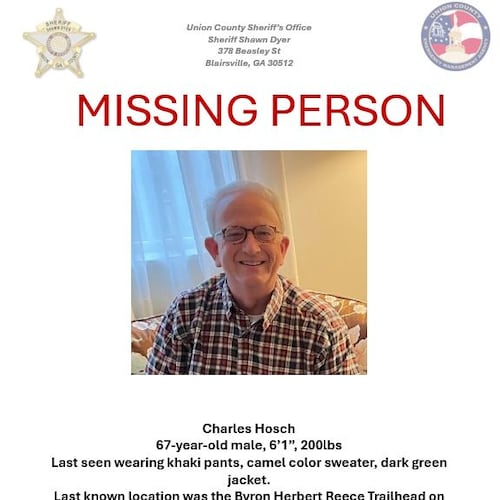The onetime west Georgia resort town of Warm Springs is being sued by its former police chief, who alleges the city’s leaders fired him and suspended virtually the entire police force with a “stunning lack of transparency and oversight.”
Emilio Quintana, who was fired as chief in June, said the city had undertaken an “unprecedented effort to overturn its police department” two years after he was hired but gave few concrete reasons why.
In a lawsuit, Quintana accused the city of violating the Georgia Open Records Act when it refused to hand over documents explaining why leaders fired him and suspended all but one of his officers.
Officials in Warm Springs, a town most famous as the home of President Franklin D. Roosevelt’s Little White House, have said little publicly about what prompted the extraordinary upheaval, which included asking two state agencies to investigate the department and its officers.
In court papers, the city said an ongoing probe by the Georgia Bureau of Investigation precludes it from releasing the documents Quintana wants.
Mayor Robyn Pynenburg wrote in personnel records that Quintana was fired for misusing city vehicles and representing himself as an officer in ways he wasn’t authorized to, according to documents obtained by The Atlanta Journal-Constitution in response to an open records request.
And the records show that days before Quintana’s firing, an anonymous tipster emailed the mayor, saying the chief and his officers were using patrol vehicles during off-duty jobs in Atlanta, 70 miles north.
Pynenburg launched an investigation and fired Quintana days later, writing he had admitted the allegations were true, according to the records obtained by the AJC. After Quintana unsuccessfully appealed his termination, his lawyer requested a more sweeping set of records, including the mayor’s investigation files and the emails and text messages she sent discussing the situation.
Warm Springs did not turn them over. In court papers responding to Quintana’s lawsuit, the city said the records were exempt from disclosure, citing an exemption that typically applies to law enforcement agencies conducting investigations.
In the wake of the anonymous tip, the city suspended every officer except the assistant chief that Quintana recruited to the department, Aisha Al-Khalifa, who was tabbed to replace him.
Pynenburg, Warm Springs attorney Rob Morton and city manager Dena Moore did not respond to requests for comment. Al-Khalifa, who has been the police chief since June, also did not respond.
Warm Springs also asked GBI and the Georgia Peace Officer Standards and Training Council to investigate. Quintana alleges the city wouldn’t even give him copies of its letters to those agencies laying out what it wanted investigated.
GBI is still investigating the situation, according to agency spokeswoman Nelly Miles. POST is investigating three former Warm Springs officers, including Quintana, and it may look at additional officers depending on what GBI finds, said the agency’s deputy executive director, Chris Harvey.
Before the turmoil, 14 officers were affiliated with the Warm Springs Police Department in POST’s records, a large roster for a town of only about 500 residents. Now there are just three.
But even when the town had only one working officer — Al-Khalifa — the reduced staffing seemed to cause minimal concern locally. The Meriwether County Sheriff’s Office, for instance, said it wasn’t unusual for its deputies to respond to calls in Warm Springs because the city police didn’t have around-the-clock coverage.
That’s because many Warm Springs officers were part-time volunteers who picked up shifts to retain their state certification while working private security jobs, some officers have said. The anonymous tipster’s email suggested that the volunteers “were hired just so they are able to do police off-duty jobs.”
The upheaval caused alarm among those officers, according to Quintana’s lawsuit, as their suspensions caused them “substantial issues.”
Warm Springs’ decision not to release more information, the lawsuit alleges, has served to “hinder its officers from obtaining employment.”
AJC data specialist Jennifer Peebles contributed to this article.
About the Author
Keep Reading
The Latest
Featured


